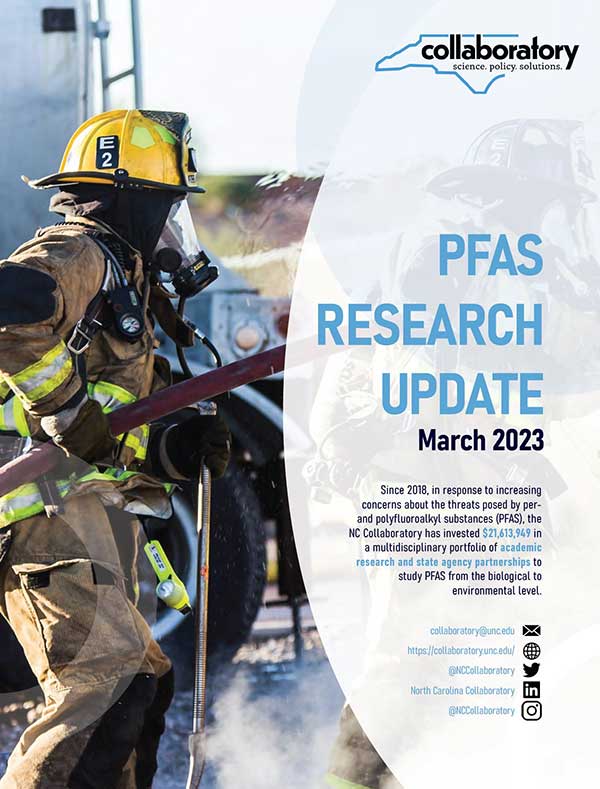
(PDF format – 47 MB)
Since 2018, in response to increasing concerns about the threats posed by per- and polyfluoroalkyl substances (PFAS), the NC Collaboratory has invested $21,613,949 in a multidisciplinary portfolio of academic research and state agency partnerships to study PFAS from the biological to environmental level.
Appropriations
- $5,013,000 awarded to 23 researchers at seven universities to establish the North Carolina PFAS Testing Network, which conducts PFAS-related research such as analyzing known and unknown PFAS at public water supplies and toxicological analysis of newly identified, understudied PFAS
- $3,938,462 to continue and expand PFAS Testing Network research
- $200,000 for the NC Department of Insurance-Office of the State Fire Marshal to develop and maintain an online reporting portal for AFFF storage and deployment in North Carolina
- $150,000 to launch a new Applied Research Fellowship Program in partnership with the NC Department of Environmental Quality
- $8,300,092 awarded to four researchers at two universities, as well as the UNC Office of Technology Commercialization, to develop and deploy new technologies to remediate PFAS from North Carolina water
- $1,217,474 awarded to 10 researchers across four universities to study GenX and other emerging contaminants in sources such as private wells and the Cape Fear River Basin, as well as developing platforms for GenX detection
- $329,430 awarded to three researchers to examine biotreatment of GenX, the molecular mechanisms of PFAS in liver disease, and economical and sustainable approaches to PFAS disposal
- $704,045 awarded to eight researchers across four universities for PFAS research such as estimating PFAS emissions from landfills, as well as supplementary funding for the NC Office of the State Fire Marshal to create the AFFF online reporting portal
Research
- Toxicology researchers are generating data to guide new drinking water advisories for unknown PFAS compounds found in the blood of North Carolina residents
- Using the latest instrumentation and methods, chemistry researchers have discovered that PFAS might be restructured when transported through the atmosphere, potentially creating new, unknown compounds
- Researchers collecting atmospheric samples have found that PFAS can be transported far and wide through wind and rain, highlighting new exposure risks for people across North Carolina
- Samples collected from 461 water systems across North Carolina have identified strategic targets for research and regulatory action
- After detecting elevated PFAS levels, open data sharing between researchers and NC DEQ has led to urgent drinking water utility upgrades for towns
- Chemists and environmental engineers are developing new technologies for PFAS removal and disposal to improve drinking water safety in North Carolina
- In partnership with fire departments and the Office of the State Fire Marshal, researchers are learning more about airborne PFAS and other exposure risks within local firehouses
- A new fellowship program based at NC Department of Environmental Quality is expediting the transition of research into state agency action
- Using wristbands and other detection methods, researchers are helping people in high risk areas and with contaminated private wells build a comprehensive picture of their exposure to PFAS
- Biomedical researchers are examining the link between PFAS exposure and liver disease to identify possible treatment options
